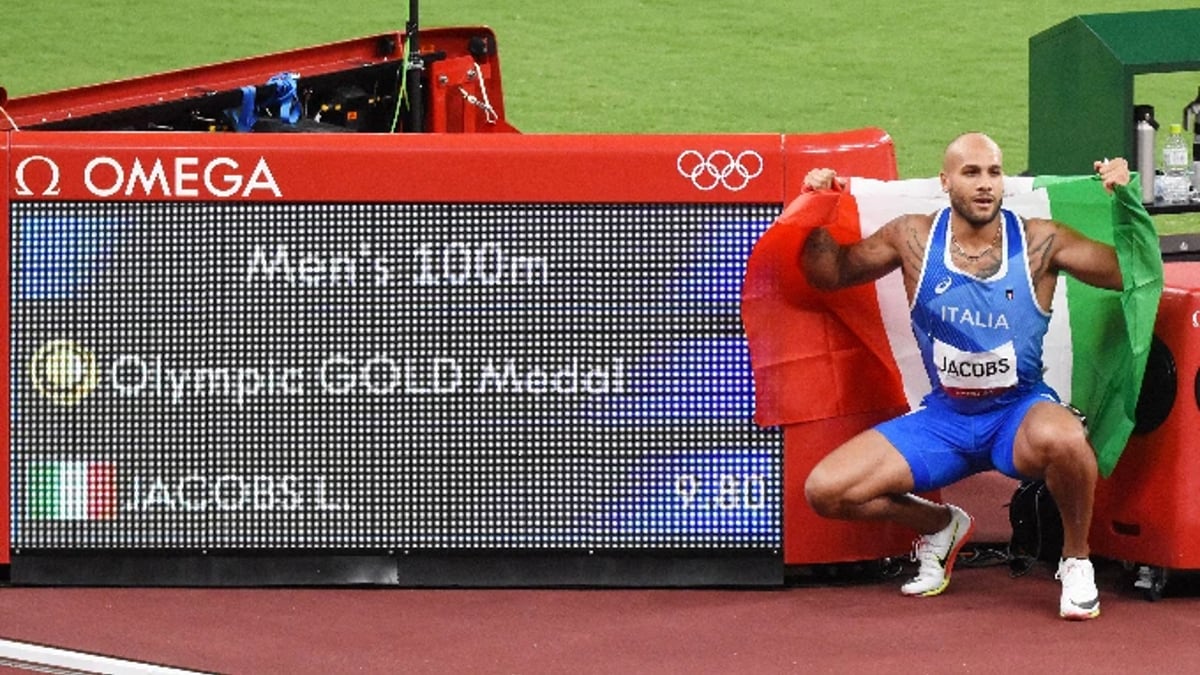How Many Steps Does It Take To Win The Men’s 100m Olympic Gold?

Italian Lamont Marcell Jacobs can lay claim to the title of being the 'fastest man on earth' after winning the 100m Olympic final in Tokyo in a time of 9.80 seconds.
It was 0.01 second faster than Usain Bolt's winning time in Rio five years ago, and Jacobs' win gave Italy their first ever medal in the 100 metres in their Summer Olympics history.
Jacobs, who was born in Texas before moving to Italy after just 18 months, only posted his first ever sub-10-second time in May.
The Italian, who was 9/2 third favourite to win Sunday's final, joins an exclusive club of men who won Olympic gold in the blue ribbon event and follows in the footsteps of Bolt who won the race in the previous three Olympics.
Pundits were wondering who would fill the void left by Bolt with Canadian Andre de Grasse looking to improve on the bronze he won five years ago while American Ronnie Baker and Su Bingtian from China qualified for the final with the fastest times in the semi-finals with 9.83 seconds.
Zharnel Hughes of Team GB was disqualified from the final following a false start which left Jacobs to battle it out with six others for the gold medal.
Men's Olympic 100m Winning Times
| Year | Winner | Time |
|---|---|---|
| 1984 | Carl Lewis | 9.99 |
| 1988 | Carl Lewis | 9.92 |
| 1992 | Linford Christie | 9.96 |
| 1996 | Donovan Bailey | 9.84 |
| 2000 | Maurice Green | 9.87 |
| 2004 | Justin Gatlin | 9.85 |
| 2008 | Usain Bolt | 9.69 |
| 2012 | Usain Bolt | 9.63 |
| 2016 | Usain Bolt | 9.81 |
| 2020 | Lamont Marcell Jacobs | 9.80 |
So, how does Jacobs' win compare to Bolt's achievements?
Compare is perhaps the wrong word to use as Bolt was and remains in a league of his own with eight Olympic gold medals in the 100m, 200m and 4x100m relay.
Bolt's achievements on the track made him stand head and shoulders above his rivals both metaphorically and physically.
The Jamaican's 6ft 5" frame made sprinting look easy on the biggest stage of all and helped Bolt cover the 100 metres in just 41 steps in each of his three triumphs in Beijing, London and Rio.
Richard Thompson took 44 steps to finish second to Bolt in 2008, while Yohan Blake and Justin Gatlin each took 43 strides to take silver in 2012 and 2016 respectively.
Steps Taken To Win The Men's 100 metres
| Year | Winner | Steps |
|---|---|---|
| 1984 | Carl Lewis | 42 |
| 1988 | Carl Lewis* | 43 |
| 1992 | Linford Christie | 44 |
| 1996 | Donovan Bailey | 44 |
| 2000 | Maurice Green | 45 |
| 2004 | Justin Gatlin | 42 |
| 2008 | Usain Bolt | 41 |
| 2012 | Usain Bolt | 41 |
| 2016 | Usain Bolt | 41 |
| 2020 | Lamont Marcell Jacobs | 45 |
Jacobs stands three inches shorter than the Lightning Bolt and the 2020 winner took 45 steps to be crowned Olympic champion in Tokyo, which is the most since Maurice Green in Sydney in 2000.
Before Bolt's dominance began in 2008, Justin Gatlin took 42 steps to win the 2004 final in Athens which matched Carl Lewis' total to win gold in 1984 on home soil in Los Angeles.
The 2020 final lacked the drama of previous races, but that won't matter to Jacobs and his life-changing victory.
*The most controversial 100m final remains the battle in Seoul between Ben Johnson and Lewis, who was looking to win back-to-back titles in 1988.
Johnson romped to victory taking 46 steps in just 9.79 seconds. In what has been described as the 'dirtiest race in history', it would have been a new world record, had it not been for a failed drugs test that stripped the Canadian of the gold medal which was later awarded to Lewis.

Lewis took 43 strides to cover the distance in a world record time of 9.92 seconds, two fewer strides than the current Olympic champion who will be 29 when the 2024 Olympics take place in Paris.
2022 is a World Championship year where the best of the best in athletics will once again take to the track in the States to be crowned the best athletes in the world.
The Americans will want to dominate on home soil, but Jacobs, who became the first European to win the 100m final at the Olympics since Linford Christie in Barcelona in 1992, will want to prove that his win in Toyko was no fluke.
And born in America, Jacobs has an added incentive to go for gold and become world champion as well as Olympic champion.









